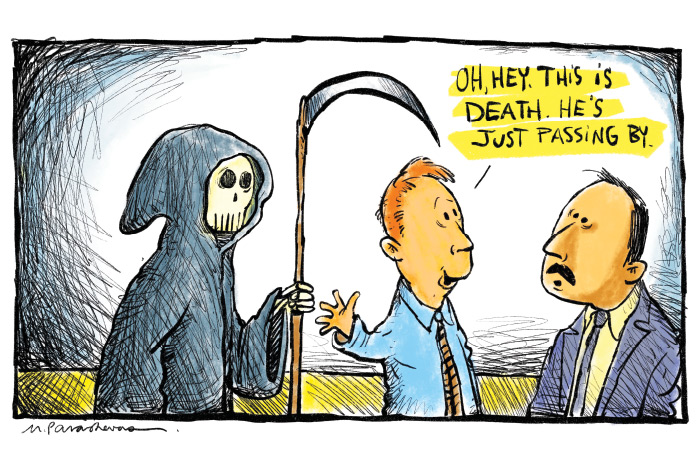Trap Door: When You Can Hide Behind a Declaration That You’re Dead

Three years ago, a 63-year-old man named Constantin Reliu returned to his homeland in Romania to live out his senior years. Arriving at the airport in Bucharest, he got on the customs line for citizens with passports. When he showed his, the customs agent told him that Constantin Reliu was dead. They’d take his passport.
Reliu vigorously insisted it was him, though, and so they took him aside where senior officials compared him to his passport. They measured the distance between his eyes and determined the distance was the same as on the passport. They asked him questions about his hometown of Barlad—Where is town hall? What street did he live on?—and he told them. They checked his fingerprints and they matched. After six hours of grilling, they agreed it was him and let him and his passport through.
But they couldn’t do anything further about the fact that he was dead.
Today, he is still dead. But he has made a big deal about it. So, the Associated Press, upon learning of it, interviewed him by phone.
He told them he had migrated from Romania to Turkey 25 years ago to get work. He’d send for his wife once he was settled. He’d found work as a cook. But she didn’t come. And so three years later, in 1995, he returned to Romania, only to find she had taken a lover.
Filing for divorce, he went back to Turkey and resumed his work there, remaining for the next 22 years until last December, when, because of expired papers, Turkey told him he’d have to go back to Romania. He thought of this as an opportunity. He’d retire and dabble with part-time work.
But that could not happen. In 2016, his wife had him declared dead. She’d also moved to Italy.
Reliu got very emotional on the phone in his interview with the AP. He was near tears. He said he applied to have his death certificate overturned in the regional capital of Vaslui. But they refused, saying he had applied “too late.”
“I am not sure if I am divorced or not. I am not sure whether she married someone else or not. Nobody will tell me.”
He said he’d gone to officials in Barlad and asked them to issue him papers declaring that he officially “existed,” but they also refused. He also asked them to overturn his death certificate, and they referred him back to Vaslui saying Vaslui handled that procedure.
“I am officially dead, although I’m alive,” he told the AP. “I have no income and because I am listed as dead, I can’t do anything. I am a living ghost.”
He then said he was going to cry.
Personally, I think that Reliu is taking all this too hard. There’s lots of things you can do when you’re officially dead. For example, you could start having an affair and then one morning just leave. You would be off like the wind.
You could steal—I am not recommending this, but you could. You could steal a big $2,000 flat-screen TV from a house—a surveillance video camera inside one such house here in East Hampton shows a thief very clearly doing just that, sitting in a chair, watching it before leaving with it—and when you get arrested they’d have to let you go.
You could park at the beach without a parking sticker. Who could they give a ticket to?
You would work for cash—you don’t take checks. You’d have no worries about credit scores and people hacking into your identity. So what if a pickpocket took your wallet? If you got lots of cash—again, I’m not recommending stealing—and wanted to give some to charity, you could convert your cash to a money order and give it anonymously.
And so what if you couldn’t vote? Look where it’s gotten us.
You could lead a happy go-lucky life. Travel around the country. Camp in Yellowstone Park. Take naps. Go waterskiing. Sit in bars and meet people—leaving your cash tip on the counter.
Personally, if I were dead, I wouldn’t be making such a big deal about it. I wouldn’t call the AP. I’d keep it hush-hush.
Know what I mean?








